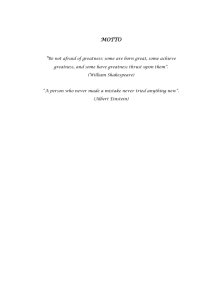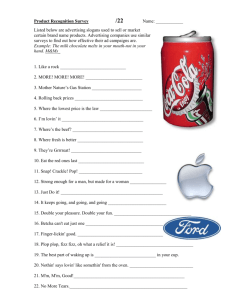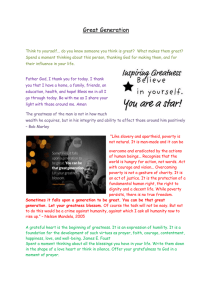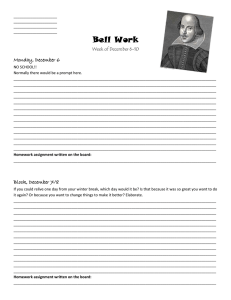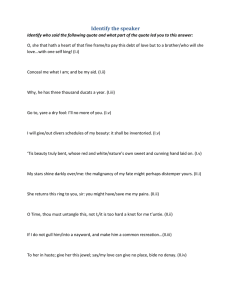Presentation - Roosevelt University Blogs
advertisement
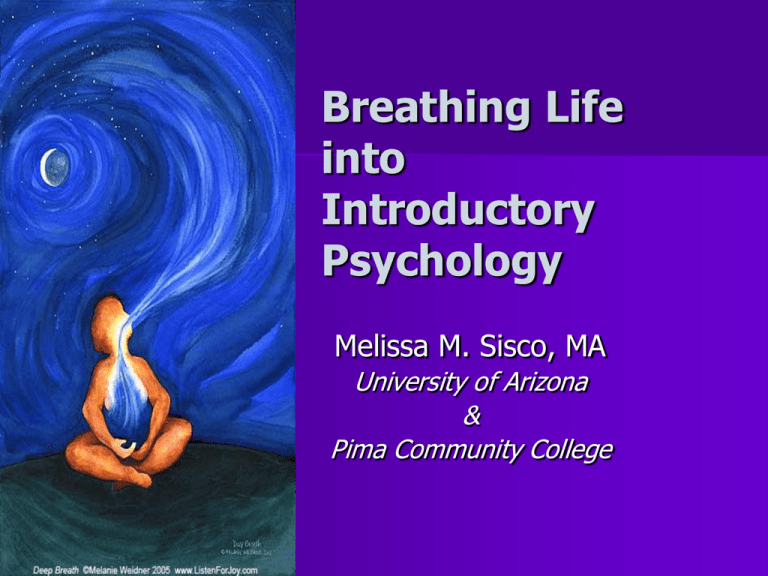
Breathing Life into Introductory Psychology Melissa M. Sisco, MA University of Arizona & Pima Community College Agenda Being in a room of amazing instructors The making of greatness Creatively teaching The three A’s CLASSE- Application modality An Empirical Plan Multiple Perspectives I have been in college for 11 years I teach with this same framework and have found success clinically and academically with: – – – – Prisoners Community College Students University Students Young adults The Making of Greatness What makes a GREAT teacher? Relax, breath deep, close your eyes and remember What makes you a GREAT teacher? See yourself in action The Role of A Teacher Psychologist Actor Role Model Resource Connection Group Leader Information Liaison Evaluator Being Prepared for… Personal Disclosures – When should I disclose? – How do I deal with student disclosures? Clarification of boundaries – Love and sexuality ≠ Acceptance and trust Providing referrals to mental health resources Normalizing and services for disabilities – Disability resource center or in-class Requested exceptions in evaluation Problematic students – The talker, the jerk, the socializer, the sleeper Creatively Teaching from Multiple Hats Let’s Brainstorm a Topic As a group, try to come up with as many creative ways to teach this topic The topic: Perception (the meaning given to sensation) Hint: Remember that vision of yourself in Greatness. Evaluating ourselves What are the commonalities between groups? What are the differences? Is anything missing? How creative do you feel you were (010)? A New Framework: The 3 A’s Appreciation of Facts Analysis of methods Application in life Appreciation Reading In class discussion Powerpoints Analysis Questioning studies Considering confounding factors – Researcher bias – Sample selection – Failure to provide alternative theories – Confounding circumstances Designing more sound research Application Discussion of application in the field In class participation Personal application of techniques Observation of friends/family Journaling Movie/music evaluation Case studies Creative Teaching Round 2 Again, as a group, try to come up with as many creative ways to teach this topic Remember to address the three A’s: – Appreciation of Fact – Analysis of the method – Application to life Hint: Remember your greatness! Evaluating ourselves What are the commonalities between groups? What are the differences? Anything missing? How creative do you feel you were (010)? CLASSE- Teaching by Student Style Reaching students with CLASSE Cognitive-Intuitive Logical Artistic Sensory Social Experimental Cognitive-Intuitive Description: The student who connects with information through anecdotal experiences, case studies, and feelings. Key Strategies: – Discussing feelings or experiences regarding a topic – Analysis of case studies – Perceptual applications – Capturing a moment of your life – Helping a friend with psychology – Group treatment strategies Logical Description: The student who enjoys logic, problem solving, or analyzing world issues Key Strategies: – – – – – Devil’s advocate Group debates Jeopardy Position papers Forced position- pursuade the class Artistic Description: The student who connects greatly with music, movies, theatre, or poetry/writing Key Strategies: – Musical likenesses – Analyzing videos – Class role plays – Diagrams and graphical completion – Journaling about topics – Credit for related video/music production Sensory Description: Physical students who likely pursue athletics, dance, or other physical endeavors. These students often enjoy class competitions. Key Strategies: – – – – Physical plays on patterns Paper ball pass Relays with neighbors Class information races Social Description: The social student is highly motivated by social interactions Key Strategies: – Group projects – Pairing up – Ice breaker exercises – Class discussions – Social experiments (in or out of class) Experimental Description: Students who appreciate the scientific values of psychology often engaged in related degrees such as architecture, scientific fields, math, or often fine arts or music Key Strategies: – Discussion of confounds – Designing experiments – Discussion of validity – Article reports – Research assignments – Teach a topic assignment – Perfect an experiment that has been done Where do you fall? Most of your students? Cognitive-Intuitive Logical Artistic Sensory Social Experimental Empirical Support for Teaching Evaluating Teaching Downfalls – Problems of self-evaluation – Overloaded schedules Benefits – Proven success – The ability to truly improve as a teacher – In-place reusable forms – Students feeling heard Methods of Keeping Track Self-Evaluation – Meeting class criteria (meeting the 3 AAA’s with CLASSE) Students Evaluation – Grades – Student correspondence – Periodic feedback forms Peer Evaluation – Video/audio recording – Participation in a class Self-Evaluation- Perception Aims Appreciation Analysis Application Cognitive-Intuitive Logical Artistic Sensory Social Experimental Met √ √ √ √ √ √ √ √ √ Task Perception=meaning Tests of Perception- valid? Perceptions in life? Feelings with objects Class debate on validity Display of test images Ball toss for interpretation Table discussion- tests Making a valid Rohrschach Periodic Student Reviews Do the research- Classroom research is the only type that does not need to be reviewed by the IRB. Collaborate to evaluate your style. Do these tactics work for your class? How do students categorize themselves? Do these strategies seem effective? – Compare results between techniques from day to day – Student quarterly feedback Summary You are an amazing teacher evident in the fact that you are attending this conference One size does not fit all in teaching Do the math- Show your greatness It’s not as hard as it sounds CLASSE In Action Cognitive Logical Artistic Sensory Social Experimental Cases to prepare for Group teach- AAA’s Envisioning greatness Breath & Imagine Group teach Evaluation & Progress Chart
